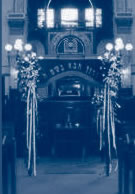|
SEDRA : VAYESHEV : Hertz Chumash p. 141
Genesis Chap. 37, verse 1
This week's Sedra is generously sponsored by Lionel Farber.
SYNOPSIS:
Jacob's favourite son was Joseph, the "son of his old
age", and he made him a coat of many colours (worn in
those days only by men of distinction). His brothers' jealousy
was aroused and increased when Joseph recounted two dreams.
In the first dream his brothers' sheaves bowed down to his
sheaf standing upright in their midst in the field. In the
second dream the sun, moon and eleven stars bowed down to
him. The implications were that all the members of his family
would become subordinate to him and although his father rebuked
him, he noted the significance of the dreams.
Whilst the brothers were tending the flock in Dothan near
Schechem, Jacob sent Joseph to see how they were faring. The
brothers, seeing him in the distance, conspired to kill him,
throw his body into a pit and then state that he had been
eaten by a wild beast. Reuben persuaded the others to cast
Joseph into the pit alive with the intention of saving him
later. A caravan of Midianites and Ishmaelites passed by and
the brothers made use of the opportunity to sell Joseph to
them for twenty pieces of silver. Reuben was not present at
this time. When he returned he was devastated that there was
no trace of Joseph. The brothers then dipped Joseph's coat
in the blood of a he-goat and brought it to their father who
concluded that Joseph had been devoured by a wild beast. He
deeply mourned the loss of his son and could not be comforted.
Meanwhile the Midianites arrived in Egypt and sold Joseph
to Potiphar, a captain of the guard.
The narrative then focuses on Judah who had married a Canaanite
woman, the daughter of Shua, who bore him three sons. The
eldest son, Er, married a woman named Tamar but he died soon
after because of his wickedness. The second son, Onan, then
married Tamar, as it was the duty of a surviving brother-in-law
to marry the childless widow, but he too died as he refused
to contemplate that a child born of the union would be named
as his brother's. Her father-in-law, Judah, asked Tamar to
wait until the third son, Shelah, was older fearing that he
might too die like his brothers. Tamar was returned to her
family. Realising that the marriage would never take place,
Tamar disguised herself as a harlot and deceived Judah so
that she would bear his child. When her condition was discovered,
Judah as head of the family, condemned her to be burnt. However,
she was able to produce pledges Judah had given her proving
he was the father of the child. Judah acknowledged his sin
in not allowing Tamar to marry his remaining son Shelah and
she was saved from death. Potiphar, highly satisfied with
Joseph's service, appointed him overseer of his household.
Potiphar's wife was very attracted to Joseph and tried repeatedly
to lure him into an affair. Joseph rejected the advances of
Potiphar's wife who then, after tricking him into a compromising
situation, accused him of an outrage. He was then thrown into
prison but soon won favour with the governor and was put in
charge of the other prisoners. Two royal officers, the chief
butler and baker, having offended the king were then in prison
pending their trial. Both had disturbing dreams which Joseph
interpreted as forewarnings of the fate which awaited them.
The butler's dream that he pressed grapes into Pharaoh's cup
was interpreted to mean that he would be restored to his office
in three days. The baker's dream of birds pecking bread from
three baskets on his head meant, said Joseph, that he would
hang within three days. Joseph requested the butler to intercede
for him before Pharaoh and secure his release. Both interpretations
were realised as Joseph had foretold, but the butler forgot
about Joseph.
HAPHTORAH Amos Chapter 2, verses 6-16, Chapter 3, 1-8
The culpability of the tribes, with the exception of Benjamin
(and of course Joseph) for the sale of their brother is referred
to by the prophet Amos. The ten tribes' lack of morality,
especially in financial affairs, brings to mind their sin
in times past.
TELL ME RABBI - ENCIRCLING THE GROOM by Rabbi Philip Heilbrunn
It is customary in many communities for the bride to be escorted
around the groom under the chupah either seven or three times.
Several meanings, each adding to the significance and relevance
of the practice, are ascribed to this custom.
There is a passage in the Prophet Jeremiah (31; 21) which
describes a future time when relationships between men and
women will be reversed "For the Lord will create a new
regime in the world - the woman will court the man .@ The
word ""&2; implies both the concept of courting
and also means to go around. There is also a concept of the
encircling being symbolic of the bride creating a "wall"
around her husband, creating an intimacy and exclusivity within
their relationship - "just the two of us, and nobody
else.." [as the sixties song goes]. The "wall"
serves to protect their relationship and keep outside desires
and influences at bay. This concept is alluded to in the Song
of Songs (8; 11) "I am a wall and my breasts are as towers,
then would I be in his eyes as a harbinger of peace".
This combines with the assertion in the Talmud (Yevamot 62b)
that "whoever lives without a wife, lives without a (protective)
wall". Our Rabbis regard the wife as being instrumental
in raising her husband's ethical and spiritual level, shielding
him from outside temptations. By creating and entering this
enclosed intimate area, bride and groom achieve the status
of a "couple" within the society, a new family with
its own identity, and with its intimacy and independence walled
off from the rest of the community.
The commitment of the Bride and Groom to each other and the
intimacy and exclusivity of their relationship is also expressed
in the verse "Therefore shall a man leave his father
and his mother and cleave unto his wife, and they shall be
one flesh" (Genesis2,24). Before marriage, the primary
focus of the bride and groom was to their parents. By encircling
her husband the bride draws an imaginary line enclosing their
relationship shifting the primary focus and commitment to
their newly created intimacy, the new centre of their life,
while leaving parents, still entitled to love and respect,
but outside the circle. The Torah legislates three basic obligations
of a husband to his wife - to clothe her, provide for her
sustenance and conjugal relations. These are symbolised by
those whose custom it is for the bride to make three circuits.
Others see the three circuits as representing the three expressions
of consecration of G-d to the Jewish people: "And I will
consecrate you to me forever; and I will betroth you to me
in righteousness and justice; and I will consecrate you to
me in faithfulness, and know the Lord" (Hosea 2,21-22).
This verse is recited by men when winding the straps of the
tephillin around their fingers.
In the same way as we consecrate our relationship to G-d
dedicating ourselves to that celestial ideal, here on earth
we equally consecrate our life dedicating and committing ourselves
to our new partner. The seven circuits evoke a mystical message
relating to the seven revolutions of the earth (a revolution
of the earth is one day) during Creation. Marriage is seen
as a Creative process emulating aspects of G-d's Creation
which occurred in seven days. The comparison of marriage to
the Creation is also used to explain the groom's aufruff.
G-d is reputed to looked into the Torah for the plan of the
Universe he was about to Create.
Similarly the groom looks into the Torah when he plans the
Creation of his new world. By circling him seven times, the
bride brings her contribution as and indispensable partner
in establishing this 'world'. Each are as hemisphere's, an
incomplete world until they combine to establish a unified
whole.
BACK TO SHABBAT SHALOM
TABLE
|








